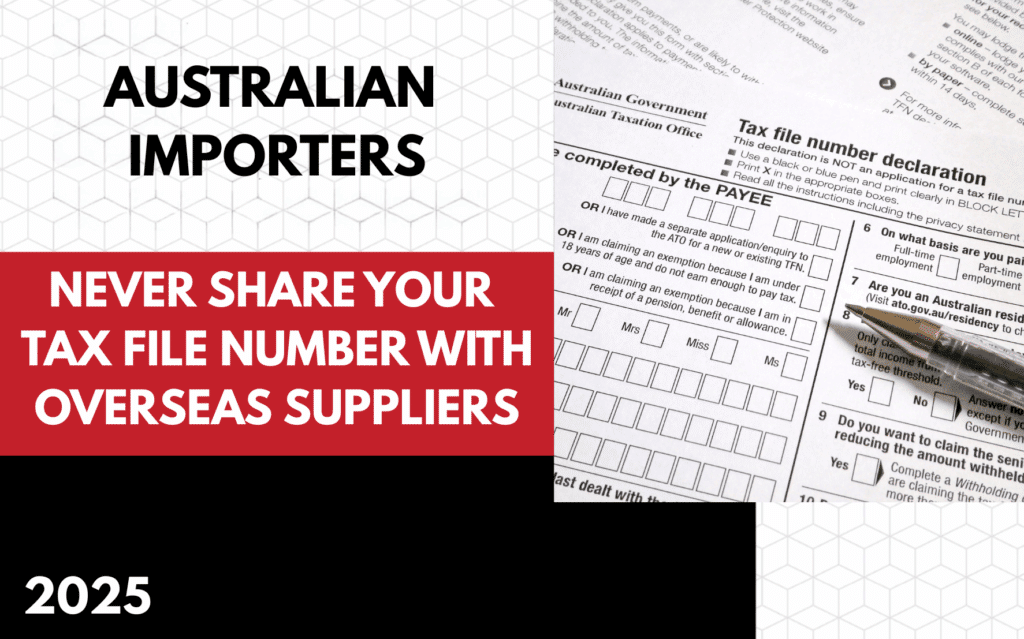
At Platinum®, we’ve encountered countless situations where Australian importers have unknowingly made critical mistakes when importing goods via sea freight, Less than a Container Load (LCL) and sea freight Full Container Loads (FCL). One of the most alarming issues that we have seen is the misuse of the Australian Tax File Number (TFN) in international shipping documents.
This blog post highlights why this happens, why it’s a serious problem, and how consulting a trusted customs broker like Platinum® can help Australian importers avoid such costly and risky errors.
The Problem: Misuse of Tax File Numbers in Import Documentation
On numerous occasions, Platinum® has been approached by Australian importers to assist with customs clearance for their LCL and FCL shipments, which are either about to arrive or have already arrived in Australia. Unfortunately, when Platinum® is not involved early in the process, before the goods have been purchased or shipped, we often discover serious issues with the export paperwork that has been prepared by the overseas supplier.
The Request for a ‘TAX I.D.’
A common scenario involves Chinese suppliers asking Australian importers to provide their ‘TAX I.D.’ information when preparing export documents. For Australian individuals who don’t own an Australian business, this request is often misinterpreted as a need to provide their Australian Tax File Number (TFN).
The Shocking Discovery
At Platinum®, we’ve seen Australian importers’ Tax File Numbers printed on shipping documents, and we’ve been horrified by this for two reasons:
- The Request Itself: Overseas suppliers should never ask for an Australian importer’s TFN.
- The Misunderstanding: Many Australian importers mistakenly believe this is standard practice and willingly provide their TFN.
Why Sharing Your TFN is a Serious Mistake
An Australian Tax File Number (TFN) is a unique identifier issued by the Australian Taxation Office (ATO). It is a highly sensitive piece of information and should only ever be shared with:
- Your employer (for tax purposes)
- Your accountant (for financial management)
- Your bank (for interest reporting)
Sharing your TFN with an overseas supplier is not only unnecessary but also exposes you to significant risks, including:
- Identity Theft: Your TFN could be misused for fraudulent activities.
- Data Breaches: Overseas suppliers may not have the same data protection standards as Australia, putting your sensitive information at risk.
How Platinum® Can Help
This issue underscores the importance of consulting with a professional customs broker, such as Platinum®, before importing goods from overseas. Here’s how we can assist:
1. Expert Advice Before You Buy
Before you commit to purchasing goods from an overseas supplier, we provide you with detailed guidance on the import process, including what information you should and shouldn’t share.
2. Oversight of Export Documentation
When Platinum® is involved early, we can oversee the communications between both you and your overseas supplier, ensuring that all export paperwork is accurate and compliant with Australian regulations.
3. Protecting Your Sensitive Information
We educate Australian importers on the proper use of sensitive information, such as TFNs, ensuring that you don’t fall victim to unnecessary or risky requests from overseas suppliers.
4. Seamless Customs Clearance
Our customs clearance team handles the complexities of customs clearance for your LCL and FCL shipments, ensuring that your goods arrive in Australia without delays or complications.
Lessons for Australian Importers
To avoid costly and risky mistakes, Australian importers should always follow these best practices:
- Consult a Customs Broker Early: Engage a trusted customs broker like Platinum® before purchasing goods from overseas.
- Understand Import Requirements: Learn what information is required for your shipment and what isn’t.
- Never Share Your TFN: Your Tax File Number should only be shared with your employer, accountant, or bank, not with overseas suppliers.
- Communicate Clearly with Suppliers: Collaborate with your supplier to ensure that they understand the Australian import requirements and avoid supplying unnecessary information.
Why Choose Platinum®?
With over 25 years of experience, Platinum® is a trusted name in Australian customs clearance. We specialise in helping importers navigate the complexities of both LCL and FCL shipments, ensuring that your goods comply with all regulations and arrive safely in Australia.
Our customs clearance team provides you with personalised advice and support, protecting you from costly mistakes and ensuring a smooth import process.
Get Expert Advice from Platinum® Today
If you are planning to import goods into Australia, don’t leave anything to chance. Contact Platinum® today for expert advice and receive support from our experienced customs brokers. Let Platinum® help you navigate the complexities of customs clearance, so that you can focus on growing your business.
